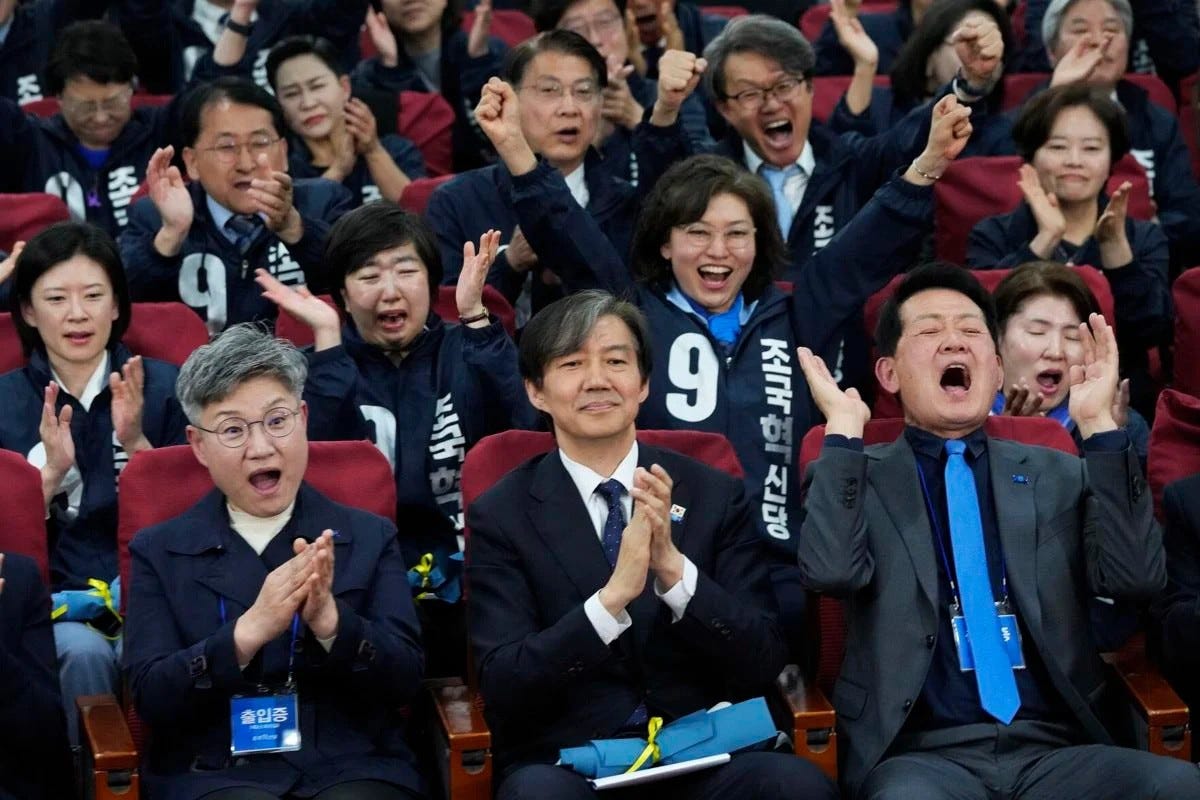South Korea Opposition Sweep Spells Trouble For Yoon’s Agenda
Democrats’ strong performance could render president a lame duck
By: Shim Jae Hoon
The opposition Democratic Party’s landslide victory in South Korea’s April 10 parliamentary elections casts a heavy shadow over President Yoon Suk Yeol’s remaining term in office, threatening to undermine his ambitious pro-business commitments and strong security posture on North Korea’s missile threats, and raising concerns in Washington over the possibility of a softening stance against both the North and China.
Yoon, a business-oriented former public prosecutor, came into office in 2022 in a backlash against former President Moon Jae-in’s hesitancy in dealing with North Korea. He has sought to implement a muscular foreign policy including a more demanding stance toward the North as well as seeking closer ties with Japan, which has antagonized many because of Japan’s brutal 35-year colonization of the Korean peninsula, which ended in 1945. Those policies, as well as allegations of corruption against the president’s wife and his brusque manner in attempting to push through his policies, cost him at the ballot box.
The center-left Democrats won 174 seats against 108 for Yoon’s conservative People Power Party in the 300-member unicameral National Assembly under the constituency district system. The remainder of the seats, chosen under a proportional representation system, have gone mostly to splinter parties largely sympathetic to the opposition. That means that Yoon has to face the rest of his five-year term in office with parliamentary control in opposition hands.
Yoon’s policy proposals such as fiscal discipline and pro-business tax legislation are likely to face tough challenges given the opposition majority’s commitment to strongly populist programs of big spending on social welfare programs. The Democrats for instance won the election partly on a plan to offer a flat cash payment of ₩1 million (US$740) to each Korean family of four this year, given slackening consumer demand that resulted in lackluster 2.4 percent GDP growth in 2023 against a consumer price index rise of 3.6 percent. The opposition has also focused attacks on Yoon’s peremptory style of running the administration, including over a recent decision to increase the number of medical doctor trainees without first forming a society-wide consensus.
The newly energized opposition Democrats are vowing to launch an independent counsel investigation into allegations of corruption on the part of Yoon’s wife, who is accused of illegal stock trading and accepting an upmarket Dior handbag from someone claimed to be a family acquaintance. The opposition lawmakers have demanded a special counsel investigation to bring her to justice. Other Democrats have hinted at bringing a no-confidence motion against members of the government. With the whole election process being swept by emotional charges and countercharges, and hardliners gaining over moderates, quite a few respected politicians were swept out of office, including former foreign minister Park Jin on the government side, and former premier Lee Nak Yon on the opposition camp. Both lost the election.
Corruption however remains a pervasive issue across party lines that looks likely to come back to bite Lee Jae Myung, the Democratic Party leader, who himself faces multiple charges of graft, embezzlement, and unauthorized contacts with North Korean officials. These charges stem from his years as mayor of Songnam City, a Seoul suburb. While Lee claims the charges are politically inspired, five people close to him have taken their lives to avoid facing subpoenas. The Democratic Party has voted down the prosecution’s request for Lee’s arrest. Lee himself has resorted to a range of evasive tactics including a hunger strike to avoid being questioned by prosecutors.
Nor is Lee the only prominent opposition figure facing potential prosecution. Cho Kuk, a former Justice Minister, and Lee’s onetime fellow party member, is appealing a two-year prison term on charges of illegally helping his daughter gain admission to a medical college. He stands to be arrested and sent to prison if the Supreme Court rejects his final appeal. He will also lose his parliamentary seat.
With leading opposition figures like Lee and Cho fighting for their political life, South Korea looks into a period of future political turbulence even after the recent elections. With the issue of corruption and political reprisals overtaking the national debate, more serious agendas like North Korean threats and inflation control have taken a back seat. In fact, the newly strengthened Democratic Party comes to parliament devoid of serious policy alternatives.
On the hustings, Lee betrayed a serious lack of heft in his economic and foreign policy thinking, condemning, for instance, the government’s trade policy as “failure” despite a hefty 2023 trade surplus. He also said Seoul should not concern itself with Taiwan’s increasingly difficult security situation in the face of China’s threats. Lee called on the government not to “provoke” North Korea despite the North’s recurrent nuclear and missile test aggravations.
Lee’s lightweight policy positions have earned him the sobriquet of being Korea’s Donald Trump. At least for the next few months, all eyes will be on the progress of the prosecution’s investigation on both Lee and Cho. The best the government can hope for at this stage is to cushion the impact of coming political clashes in the Assembly, with the prosecution continuing its investigation of the two towering opposition leaders.

